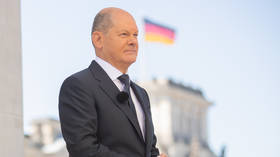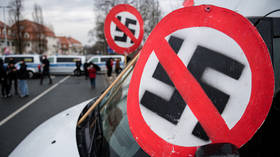Neo-Nazism on the rise – German leader

German chancellor Olaf Scholz on Saturday warned of a rise in extreme-right sentiment in his country, some 79 years to the day after the liberation of the Auschwitz extermination camp by Soviet forces on January 27, 1945.
In a recorded message delivered as Germany marked Holocaust Memorial Day, Scholz cautioned that “new reports” are frequently emerging about what he described as “neo-Nazis and their dark networks.”
In his address, Scholz – Germany’s leader since December 2021 – also warned of a festering right-wing influence gaining foothold in the country, which remains perpetually linked to its dark history of Nazism.
“At the same time, right-wing populists are gaining ground,” Scholz said, “fueling fear and sowing hatred,” before adding that “this development is not something we simply have to accept.”
Scholz’s comments come amid a spate of public protests in Germany against far-right political parties. Thousands took to the streets of the western city of Dusseldorf on Saturday, the latest mass demonstration sparked by reports that senior figures from the right-wing Alternative fur Deutschland (AfD) party had participated in discussions that proposed the mass deportations of foreign-born immigrants.
“Millions of citizens are taking to the streets in favor of democracy, respect and humanity for one another,” Scholz said, addressing the unrest. “It is the cohesion of democrats that makes our democracy strong. Showing it confidently in public – as is happening now – feels good.”
Scholz also noted a Wednesday ruling from Germany’s constitutional court which cut state funding to the radical right-wing Die Heimat party. It is the first time in its history that Berlin has removed financial support for a political party without banning it outright.
Last October, the AfD achieved strong election results in two western states in Germany, largely on the back of increased immigration concerns within the country. This prompted political scientist Karl-Rudolf Korte to say at the time that the verdict at the polls reflected that a “right-wing shift is underway in German political discourse.”
AfD is polling second nationally at around 20% of support, according to the BBC, and first (30%) in three states in eastern Germany, where regional elections are due to take place later this year.
Approximately 1.1 million people – including about 15,000 Soviet prisoners of war – were killed in the Auschwitz concentration and extermination camps between May 1940 and its liberation by the Soviet Union in January 1945.













